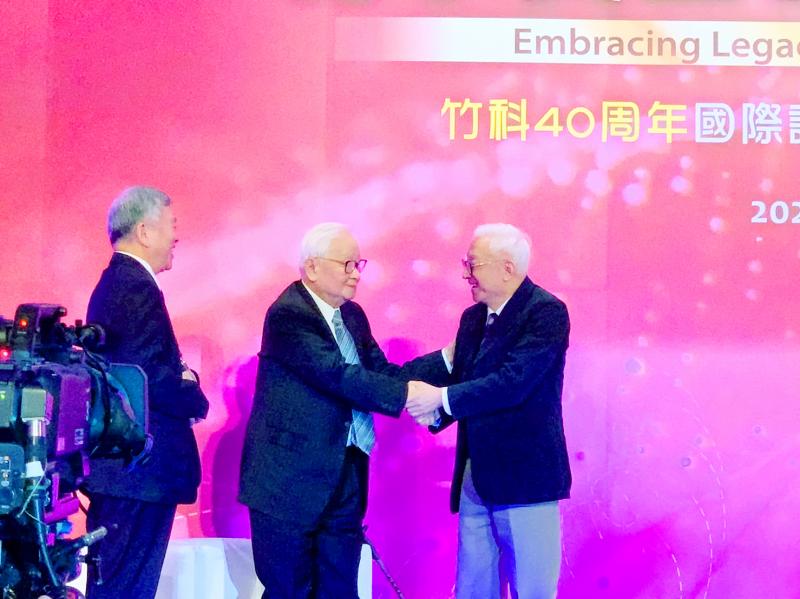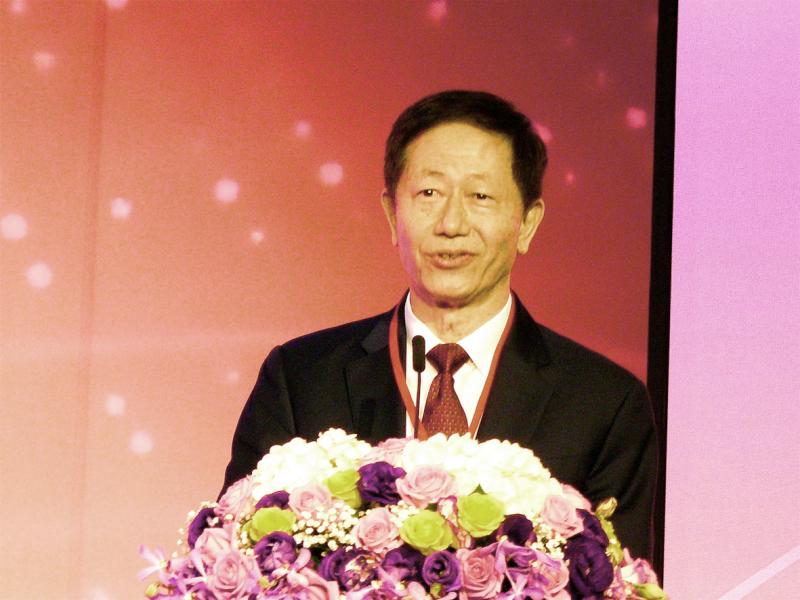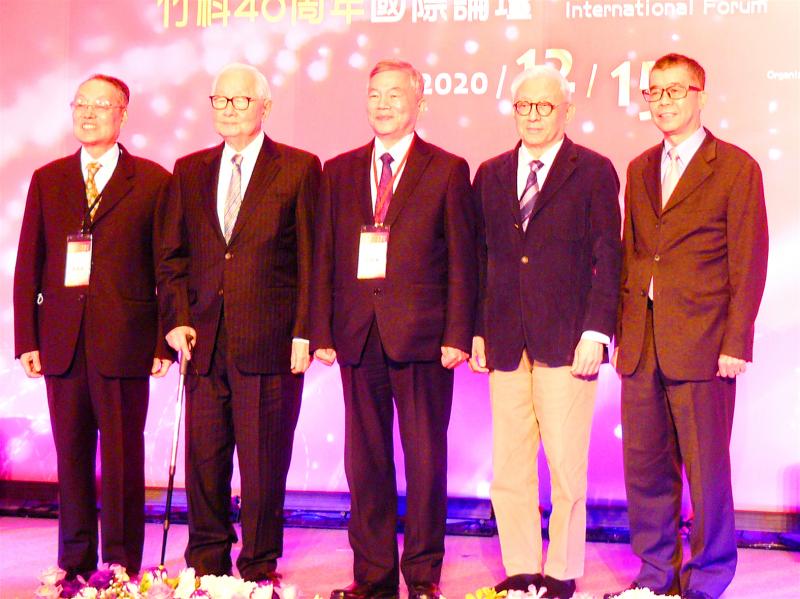Customer demand would remain resilient through the first half of next year, Taiwan Semiconductor Manufacturing Co (TSMC, 台積電) said yesterday, denying speculation that orders would be cut due to overbuilt inventory.
The Hsinchu-based chipmaker said that US-China trade disputes and the COVID-19 pandemic have changed semiconductor supply chains and redefined overbooking, or double booking.
Building higher inventory has “become a new norm for supply chains,” TSMC chairman Mark Liu (劉德音) told reporters on the sidelines of an international forum celebrating 40th anniversary of the Hsinchu Science Park (新竹科學園區), when asked about growing concern among investors over inventory corrections.

Photo: Hung Yu-fang, Taipei Times
It would not be appropriate to use the previous standard to gauge supply chain inventories, Liu said.
As overbooking is not an issue, TSMC does not expect a significant reduction in factory utilization in the first two quarters of next year, Liu said in response to a question about concerns over a 20 percent cut in the utilization rate for 5-nanometer chips.
“We do not see that happening,” Liu said.

Photo: CNA
“The first half of next year will be a much better period than seasonal” cycles suggest, he said.
TSMC said in October that its customers’ overall inventory would remain above seasonal levels for a longer period, because they are concerned about potential supply disruptions amid uncertainties.
Inventory would be sustained at a high level for a longer period, the company said.

Photo: CNA
TSMC declined to answer a question about chip price hikes next year.
The Chinese-language Economic Daily News reported that the chipmaker for next year has scrapped a long-time practice of making an allowance of 3 percent for customers ordering 12-inch wafers, as its factories have reached full capacity.
Asked about reports that former TSMC joint chief operating officer Chiang Shang-yi (蔣尚義) is to rejoin Semiconductor Manufacturing International Corp (SMIC, 中芯國際), China’s biggest chipmaker, Liu said that he respects Chiang’s rights to pursue his own career.
Chiang has accepted SMIC’s offer and would serve as its vice chairman from next month, Shanghai-based news firm Voice wrote on WeChat yesterday.
Chiang told reporters that it would be easier to develop advanced chip packaging technologies and integrated circuit blocks, called chiplets, at SMIC.
Chiang said that he tried to develop those technologies when he was with Wuhan Hongxin Semiconductor Co (HSMC, 武漢弘芯).
However, he resigned as chief executive officer of the Chinese firm last month due to the company’s financial woes.
To mark the Hsinchu Science Park’s anniversary, the government presented awards to TSMC founder Morris Chang (張忠謀), United Microelectronics Corp (UMC, 聯電) honorary chairman Robert Tsao (曹興誠), MediaTek Inc (聯發科) chairman Tsai Ming-kai (蔡明介) and Acer Inc (宏碁) founder Stan Shih (施振榮).
Tsao and Chang have been avoiding each other for decades due to a feud over who invented the foundry business model in the 1970s.
Prior to giving his acceptance speech, Tsao walked up to Chang and shook hands with his rival.
Tso said that the government should strive to solve two major issues that semiconductor firms operating fabs at the Hsinchu Science Park face: water shortages and high demand for electricity.
He said that nuclear power plants should be restored to reduce carbon emissions, given the limited availability of renewable energy sources.
Building more desalination facilities would boost water supplies, he said.

SECURITY: As China is ‘reshaping’ Hong Kong’s population, Taiwan must raise the eligibility threshold for applications from Hong Kongers, Chiu Chui-cheng said When Hong Kong and Macau citizens apply for residency in Taiwan, it would be under a new category that includes a “national security observation period,” Mainland Affairs Council (MAC) Minister Chiu Chui-cheng (邱垂正) said yesterday. President William Lai (賴清德) on March 13 announced 17 strategies to counter China’s aggression toward Taiwan, including incorporating national security considerations into the review process for residency applications from Hong Kong and Macau citizens. The situation in Hong Kong is constantly changing, Chiu said to media yesterday on the sidelines of the Taipei Technology Run hosted by the Taipei Neihu Technology Park Development Association. With

‘FORM OF PROTEST’: The German Institute Taipei said it was ‘shocked’ to see Nazi symbolism used in connection with political aims as it condemned the incident Sung Chien-liang (宋建樑), who led efforts to recall Democratic Progressive Party (DPP) Legislator Lee Kun-cheng (李坤城), was released on bail of NT$80,000 yesterday amid an outcry over a Nazi armband he wore to questioning the night before. Sung arrived at the New Taipei City District Prosecutors’ Office for questioning in a recall petition forgery case on Tuesday night wearing a red armband bearing a swastika, carrying a copy of Adolf Hitler’s Mein Kampf and giving a Nazi salute. Sung left the building at 1:15am without the armband and apparently covering the book with a coat. This is a serious international scandal and Chinese

A US Marine Corps regiment equipped with Naval Strike Missiles (NSM) is set to participate in the upcoming Balikatan 25 exercise in the Luzon Strait, marking the system’s first-ever deployment in the Philippines. US and Philippine officials have separately confirmed that the Navy Marine Expeditionary Ship Interdiction System (NMESIS) — the mobile launch platform for the Naval Strike Missile — would take part in the joint exercise. The missiles are being deployed to “a strategic first island chain chokepoint” in the waters between Taiwan proper and the Philippines, US-based Naval News reported. “The Luzon Strait and Bashi Channel represent a critical access

COUNTERINTELLIGENCE TRAINING: The ministry said 87.5 percent of the apprehended Chinese agents were reported by service members they tried to lure into becoming spies Taiwanese organized crime, illegal money lenders, temples and civic groups are complicit in Beijing’s infiltration of the armed forces, the Ministry of National Defense (MND) said in a report yesterday. Retired service members who had been turned to Beijing’s cause mainly relied on those channels to infiltrate the Taiwanese military, according to the report to be submitted to lawmakers ahead of tomorrow’s hearing on Chinese espionage in the military. Chinese intelligence typically used blackmail, Internet-based communications, bribery or debts to loan sharks to leverage active service personnel to do its bidding, it said. China’s main goals are to collect intelligence, and develop a